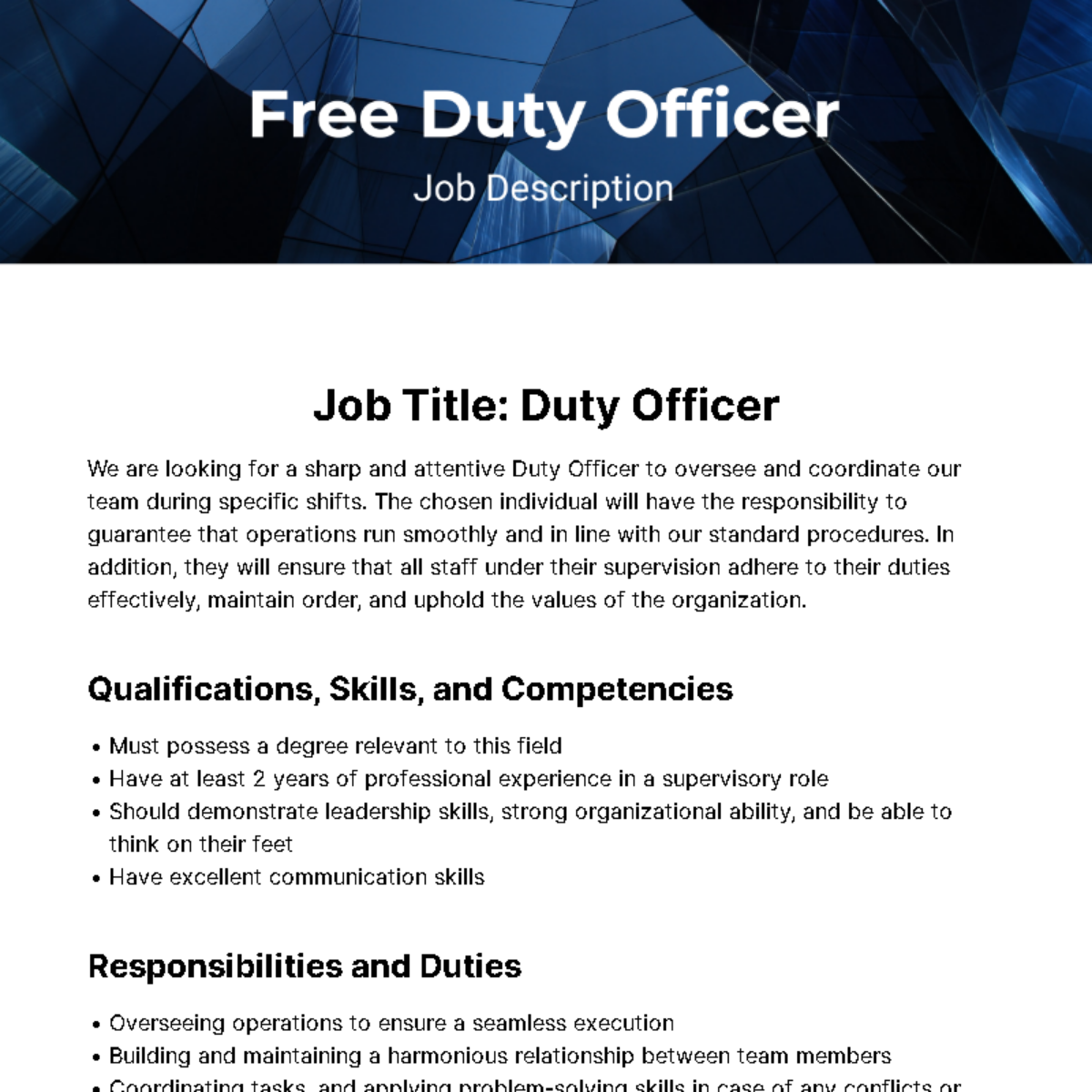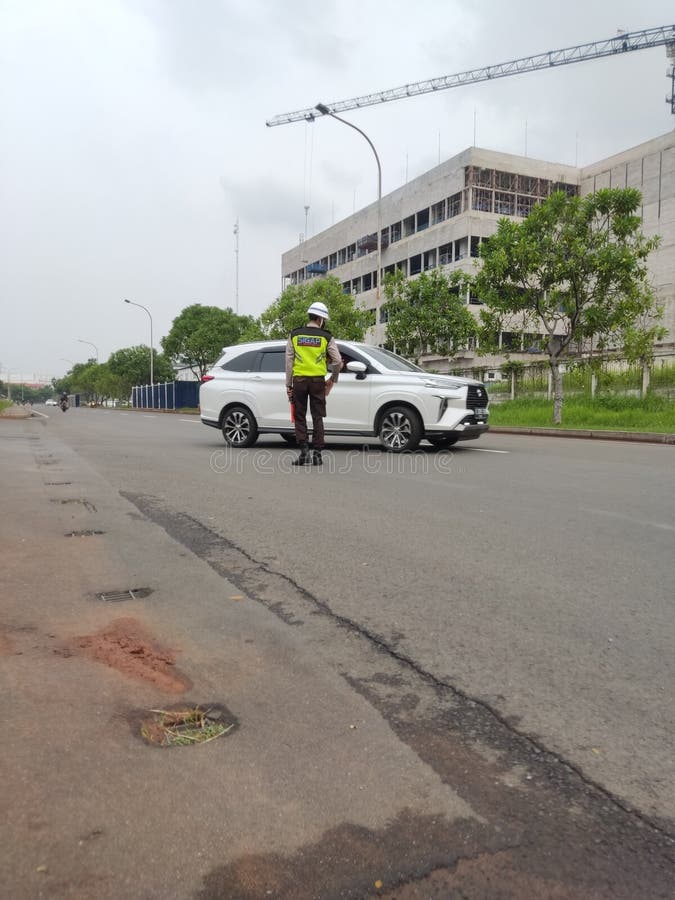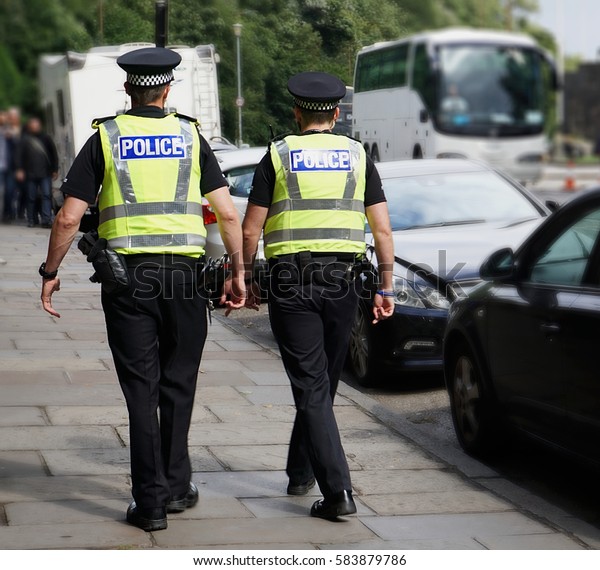In every organization, the role of an officer on duty is pivotal in maintaining smooth operations and ensuring adherence to protocols. Whether it's in a corporate setting, a military environment, or a government institution, the officer on duty plays an essential role in overseeing daily activities. Their responsibilities range from supervising staff to handling emergencies, making them indispensable to any operation.
The term "officer on duty" refers to an individual tasked with overseeing operations during a specific shift or period. This role requires a high level of responsibility, attention to detail, and the ability to make quick decisions. In this article, we will delve into the intricacies of the officer on duty's role, their responsibilities, and the skills required to excel in this position.
As we explore the multifaceted nature of this role, we will also discuss how organizations can benefit from having a well-trained officer on duty and the importance of maintaining professionalism in this capacity. Whether you're an aspiring officer or a manager looking to improve your team's efficiency, this article will provide valuable insights.
Read also:How Many Children Does Prince Harry Have A Comprehensive Guide
Table of Contents
- The Role of an Officer on Duty
- Key Responsibilities
- Essential Skills for an Officer on Duty
- Training and Development
- Common Challenges Faced
- The Importance of an Officer on Duty
- Types of Officers on Duty
- Benefits for Organizations
- Future Trends in Officer on Duty Roles
- Conclusion
The Role of an Officer on Duty
An officer on duty serves as the primary point of contact during a specific shift, ensuring that all operations run smoothly. This role is critical in various sectors, including military, law enforcement, healthcare, and corporate environments. The officer on duty is responsible for overseeing staff, managing emergencies, and maintaining communication between different departments.
Responsibilities in Different Sectors
The responsibilities of an officer on duty can vary depending on the sector. For instance, in a military setting, the officer on duty may be responsible for overseeing security operations and ensuring the safety of personnel. In a corporate environment, the role may involve monitoring office activities and addressing any issues that arise.
Regardless of the sector, the officer on duty must possess a strong understanding of the organization's policies and procedures. This knowledge enables them to make informed decisions and handle situations effectively.
Key Responsibilities
The responsibilities of an officer on duty are diverse and require a high level of dedication. Below are some of the key responsibilities associated with this role:
- Supervising staff and ensuring adherence to protocols
- Handling emergencies and coordinating response efforts
- Maintaining communication between departments
- Documenting incidents and preparing reports
- Ensuring the safety and security of personnel and assets
These responsibilities highlight the importance of the officer on duty in maintaining operational efficiency and ensuring the well-being of all stakeholders.
Emergency Management
One of the most critical responsibilities of an officer on duty is emergency management. This involves identifying potential risks, developing contingency plans, and coordinating response efforts in the event of an emergency. According to a study by the Federal Emergency Management Agency (FEMA), effective emergency management can significantly reduce the impact of disasters on organizations.
Read also:Bandel Carano Exploring The Rising Star In The Music Industry
Officers on duty must be trained in crisis management and possess the ability to remain calm under pressure. This ensures that they can make sound decisions and guide their teams effectively during challenging situations.
Essential Skills for an Officer on Duty
To excel as an officer on duty, individuals must possess a combination of technical and interpersonal skills. Below are some of the essential skills required for this role:
- Leadership: The ability to lead and inspire a team is crucial in ensuring that operations run smoothly.
- Communication: Effective communication is vital for maintaining coordination between departments and addressing issues promptly.
- Decision-making: Officers on duty must be able to make quick and informed decisions, especially in high-pressure situations.
- Attention to detail: A keen eye for detail ensures that potential issues are identified and addressed before they escalate.
- Problem-solving: The ability to think critically and develop solutions to complex problems is essential in this role.
Developing these skills can enhance an officer's effectiveness and contribute to the overall success of the organization.
Technical Proficiency
In addition to interpersonal skills, officers on duty must also possess technical proficiency. This includes familiarity with relevant software, communication systems, and security protocols. Organizations often invest in training programs to ensure that their officers on duty are equipped with the necessary technical skills to perform their duties effectively.
Training and Development
Training is a crucial aspect of preparing individuals for the role of an officer on duty. Organizations must invest in comprehensive training programs that cover both theoretical and practical aspects of the job. These programs should include modules on leadership, communication, emergency management, and technical skills.
Continuous Learning
Given the evolving nature of organizational operations, continuous learning is essential for officers on duty. This involves staying updated with the latest industry trends, technologies, and best practices. Organizations can facilitate this by providing access to workshops, seminars, and online courses.
Research conducted by the Association for Talent Development (ATD) highlights the importance of continuous learning in enhancing employee performance and organizational success. By prioritizing training and development, organizations can ensure that their officers on duty are well-prepared to handle any situation that arises.
Common Challenges Faced
Despite the importance of their role, officers on duty often face numerous challenges. These challenges can range from managing difficult personnel to handling unexpected emergencies. Below are some of the common challenges faced by officers on duty:
- Dealing with unpredictable situations
- Managing conflicts between staff
- Ensuring compliance with regulations
- Maintaining effective communication
- Handling multiple responsibilities simultaneously
Overcoming these challenges requires a combination of experience, skill, and resilience. Officers on duty must remain adaptable and open to learning from their experiences to improve their performance.
Stress Management
One of the most significant challenges faced by officers on duty is managing stress. The high-pressure nature of the role can lead to burnout if not addressed properly. Organizations can support their officers by providing resources such as counseling services and stress management workshops.
The Importance of an Officer on Duty
The role of an officer on duty is crucial in ensuring the smooth operation of any organization. Their presence provides a sense of security and stability, knowing that there is someone responsible for overseeing activities and addressing issues promptly. This role also contributes to the overall efficiency and effectiveness of the organization.
Impact on Organizational Success
Having a well-trained and dedicated officer on duty can significantly impact an organization's success. According to a report by the Harvard Business Review, effective leadership at all levels of an organization is a key driver of success. Officers on duty play a vital role in leadership, ensuring that operations are aligned with the organization's goals and objectives.
Types of Officers on Duty
Depending on the sector and organization, there are various types of officers on duty. Below are some common examples:
- Military Officers on Duty: Responsible for overseeing security and operations in military settings.
- Law Enforcement Officers on Duty: Focus on maintaining public safety and enforcing laws.
- Corporate Officers on Duty: Oversee office activities and ensure compliance with company policies.
- Healthcare Officers on Duty: Manage patient care and coordinate with medical staff.
Each type of officer on duty brings unique skills and expertise to their role, contributing to the success of their respective organizations.
Specialized Training
Different types of officers on duty often require specialized training to address the specific needs of their sector. For example, military officers on duty may undergo rigorous physical and tactical training, while healthcare officers on duty focus on medical protocols and patient care. This specialized training ensures that officers are well-prepared to handle the unique challenges of their roles.
Benefits for Organizations
Hiring a dedicated officer on duty offers numerous benefits to organizations. These benefits include improved operational efficiency, enhanced security, and increased employee satisfaction. Below are some of the key benefits:
- Improved communication and coordination
- Reduced risk of errors and incidents
- Enhanced employee morale and productivity
- Increased customer satisfaction
By investing in a competent officer on duty, organizations can create a more efficient and secure working environment, leading to long-term success.
Return on Investment
While hiring an officer on duty may involve additional costs, the return on investment can be significant. According to a study by the Institute for Corporate Productivity (i4cp), organizations that prioritize leadership development and operational efficiency tend to outperform their competitors. This highlights the importance of investing in key roles such as officers on duty to drive organizational success.
Future Trends in Officer on Duty Roles
As technology continues to evolve, the role of an officer on duty is also transforming. Future trends in this field include the integration of advanced communication systems, artificial intelligence, and data analytics. These technologies can enhance the effectiveness of officers on duty by providing real-time information and improving decision-making capabilities.
Adaptation to Technological Advancements
To remain competitive, organizations must adapt to these technological advancements and ensure that their officers on duty are equipped with the necessary tools and skills. This involves investing in training programs that focus on emerging technologies and their applications in the workplace.
Conclusion
The role of an officer on duty is vital in ensuring the smooth operation and success of any organization. By understanding the responsibilities, skills, and challenges associated with this role, organizations can better support their officers and maximize their potential. Investing in training and development, as well as embracing technological advancements, can further enhance the effectiveness of officers on duty.
We encourage readers to share their thoughts and experiences in the comments section below. Additionally, feel free to explore other articles on our site for more insights into leadership and organizational development. Together, we can continue to improve and grow in our respective fields.


